Meridian raises $7M seed round led by 645 Ventures.
Read More
This in-depth comparison looks at features, use cases, pricing, and more of top Salesforce competitors to help you make the best choice for your firm.

Private equity pipelines span years, not quarters. And deals rely on relationships, not demo requests. So you need something sharper than Salesforce for your customer relationship management (CRM) system.
For many PE firms, Salesforce feels like more work than reward. It’s built for fast-moving sales orgs rather than multi-stage sourcing, complex market mapping, or in-depth IC prep. Adoption across the firm is often low, configuration is expensive, data transfer is manual, and most deal teams end up back in Excel.
Rest assured, there’s a better way. In this list, we feature four Salesforce alternatives for private equity firms that fit into PE operations and workflows from day one.
Our top private equity CRM Salesforce alternatives:
Salesforce may be the go-to CRM across industries, including financial services, but that doesn’t mean it works well for private equity firms.
The platform is built for high-volume sales environments where cycles are short and funnels are simple and replicable. The setup just doesn’t work for alternative investment firms. This is especially true when you have to track complex relationships over multi-year timelines and tie together scattered deal history to surface opportunities before competitors do.
And while it can technically be customized to meet the needs of the private equity industry, doing so takes serious time, money, and resources. Even once you’ve configured Salesforce for private equity, you’ll likely be left with a Frankenstein-like CRM that’s far from intuitive to use.
The result? It doesn’t take long before adoption starts to stall. Associates, VPs, and partners default to Outlook, Excel, and other siloed software. Context gets lost, and deal flow suffers. All because working on legacy systems feels easier than learning to navigate an entirely new interface while still having the hassle of manual data entry.
Ultimately, Salesforce becomes an overhead line item that’s maintained by the back office, ignored by the front office, and fails to deliver on its promise to help you find better deals, faster.
Salesforce is great for teams working with a basic sales pipeline, but that doesn’t make it the right CRM for private equity. Below, we’ve shortlisted four CRM platforms that are better suited to the way PE firms actually operate.
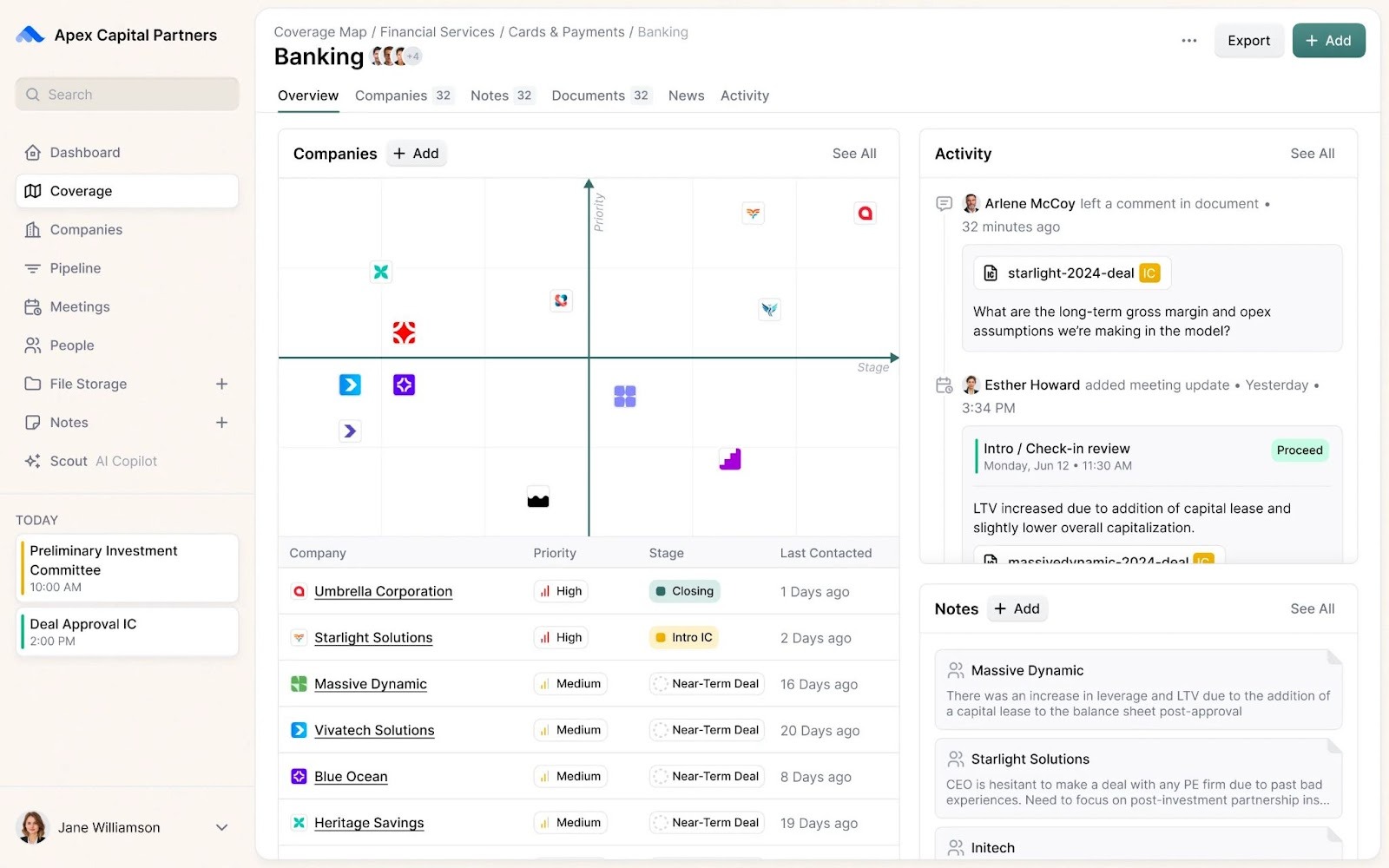
Focus Area: Complete AI-powered CRM for PE
Meridian isn’t your average CRM solution. It’s the AI-native CRM for private equity, built from the ground up by industry experts to match the rhythm of your firm’s workflows. It surfaces data to optimize deal sourcing and eliminate annoying admin. It was also built with AI as a core asset, not an add-on.
Deal teams live in Outlook, so Meridian makes data capture from the platform effortless. Emails, meetings, and contacts are auto‑logged and auto‑tagged with just a few clicks. Plus, the platform mines your deal history, merges it with public market intelligence, and bundles everything into your deal pipeline with no need for manual data entry.
In addition to powerful deal flow management features, Meridian supports thematic sourcing and market mapping, IC prep, banker and advisor tracking, and LP relations.
In the Meridian vs Salesforce comparison, the difference comes down to fit: Meridian is built for how private equity teams actually operate, no need to overhaul a generic sales CRM to suit your needs.
From data enrichment and IC workflow automation to thematic sourcing and deal flow management, Meridian handles all your firm’s most important processes.
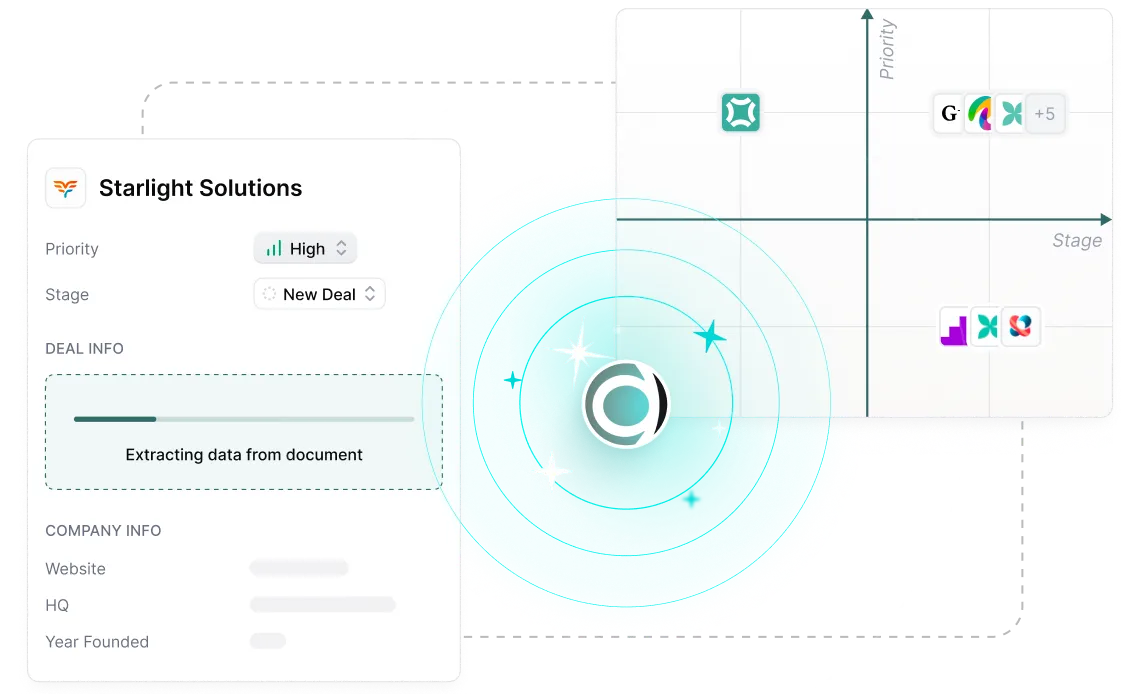
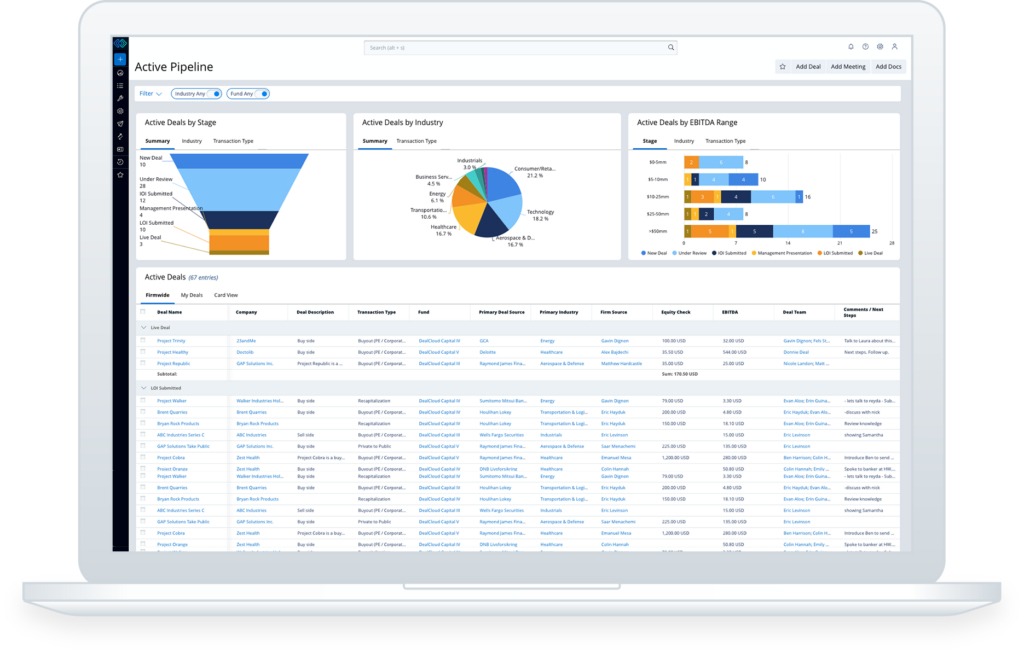
Focus Area: Deal and pipeline management for financial services
DealCloud pitches itself as a one-stop CRM for firms in the financial services industry, covering everything from investment banking to private equity and credit. It offers deal and relationship intelligence tools for financial professionals that want to manage pipelines, fundraising, and audits in one place.
Configurability is a big benefit for DealCloud users. Dashboards can be tailored to reflect unique sourcing funnels, custom reporting supports IC workflows, and portfolio reviews and audit features track every click for compliance and governance.
But the time it takes to get DealCloud up and running is a drawback. Implementation often stretches across months, and private equity professionals may have to rely on the DealCloud team to get set up. In addition, you may be looking at inconsistent and buggy formatting issues, which creates additional headaches and time utilization issues.
DealCloud is a CRM that’s designed specifically for financial services firms, meaning it can be adapted to the needs of businesses in the private equity space much more easily than Salesforce.
Learn how DealCloud compares to other competitors in our DealCloud alternatives article, or see a side-by-side comparison of Meridian vs. DealCloud.
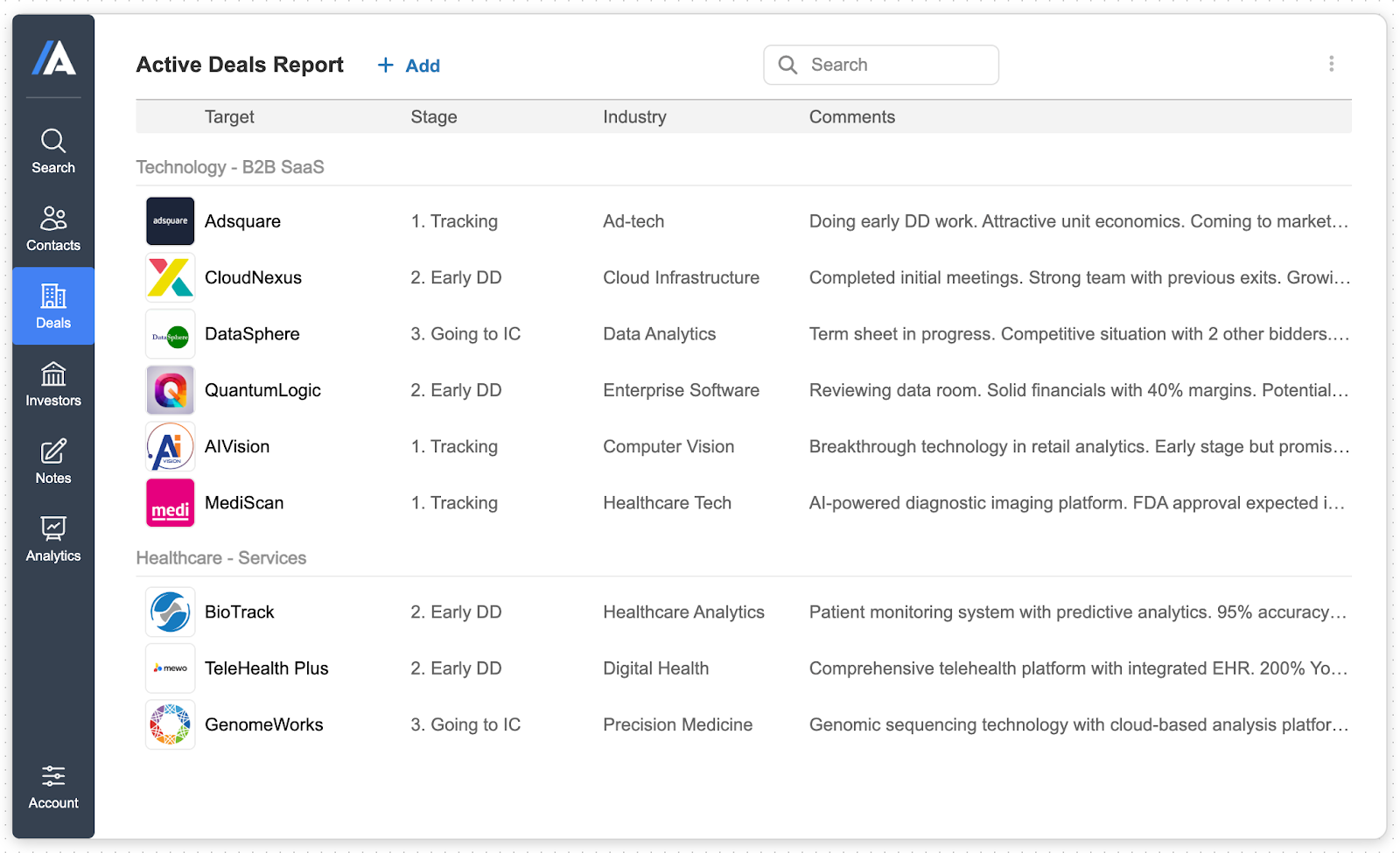
Focus Area: Streamlined contact management
ListAlpha is built for private equity and venture capital firms. It promises to bring pipelines, contacts, and deal data onto one platform and is able to sync, enrich, track, and surface your vital connections with clarity, speed, and minimal friction.
The platform aims to be a PE firm’s modern deal flow “workbench.” It pulls your contacts, deals, and other data onto a single interface that’s designed by people who’ve actually sat in the seats you’re in.
While it’s good at capturing contacts and unifying relationship data, its features for back-office functions or portfolio monitoring are limited. Teams that require multi-layered approvals and more extensive workflow automation will probably need additional tools to get these jobs done right.
ListAlpha is much faster to implement and easier to adopt than Salesforce, which requires complex, manual configuration.
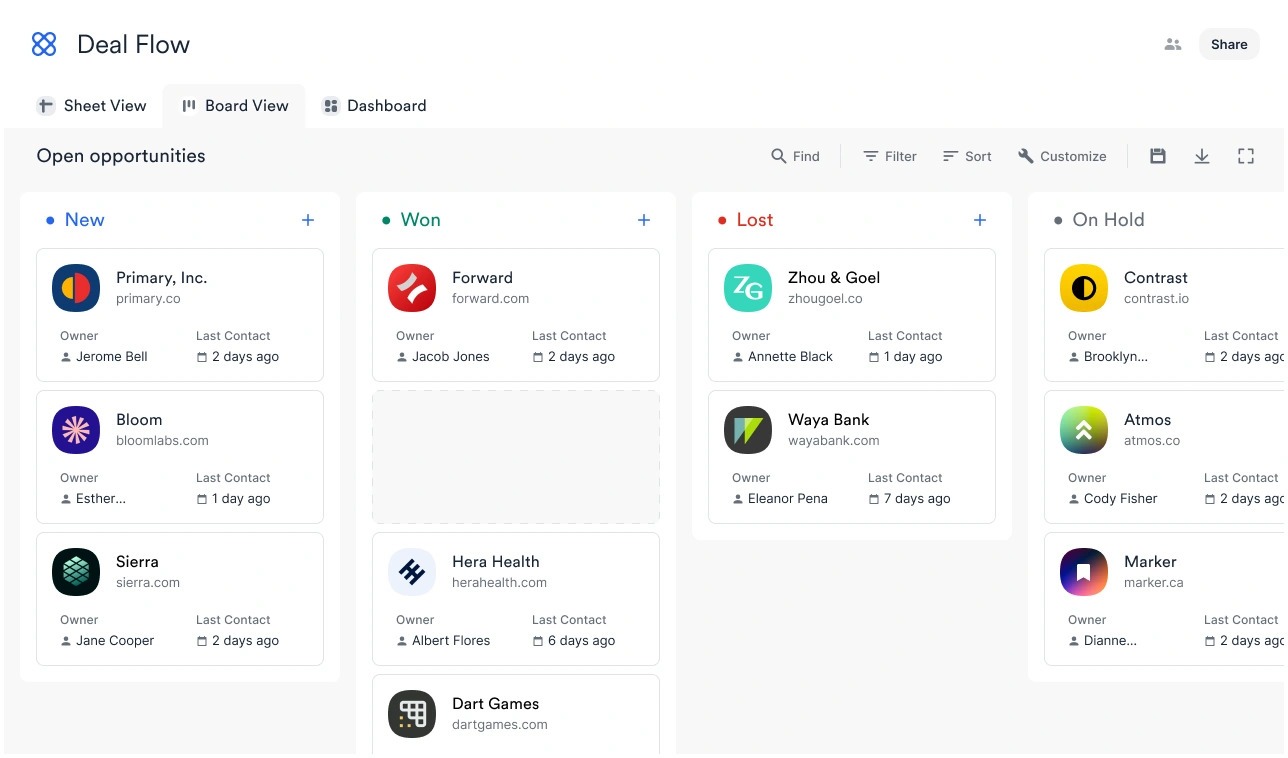
Focus Area: AI-powered deal intelligence
From relationship scoring to sourcing insights, Affinity’s feature set is designed to sharpen PE teams’ business intelligence. Its relationship intelligence platform helps deal teams make warm intros and surface opportunities based on the strength of your connections.
After capturing relationship data from emails and calendars, it maps connections across your firm and scores them by strength. This allows you to prioritize warm intros that actually lead somewhere.
While its relationship mapping capabilities are strong, some firms find their integration ecosystem limiting, meaning it can struggle to adapt to the complex workflows PE teams rely on.
Where the Salesforce platform has rigid pipelines and manual data entry, Affinity works in the background to automate relationship tracking and give deal teams greater visibility over potential opportunities.
Learn how Affinity compares to other competitors in our Affinity alternatives article, or see a side-by-side comparison of Meridian vs. Affinity.
When you’re looking for the best private equity CRM alternative to Salesforce, you’ll want a platform that fits the way your team actually works right out of the box. Prioritize a platform that:
With Salesforce, PE firms often find themselves pouring time and resources into systems that were never designed for long deal cycles or complex team workflows. It’s a powerful platform for other industries, just not one that syncs with how private equity firms actually operate.
Meridian is different. Built by private equity experts for private equity workflows, it automates the tasks that usually slow PE down.
By centralizing deal history, enriching data, and tracking banker relations, sourcing becomes faster, IC prep becomes simpler, and your CRM becomes something your firm actually uses. Add AI-powered insights and you have a time-saving system built to help you source better deals.
For private equity firms looking to spend less time chasing context and more time following the right opportunities, Meridian wins.
Discover how Meridian can streamline deal sourcing and enhance your decision-making

Meridian was built by and for PE professionals, providing tools that keep your firm strategic, efficient, and ahead of the game.
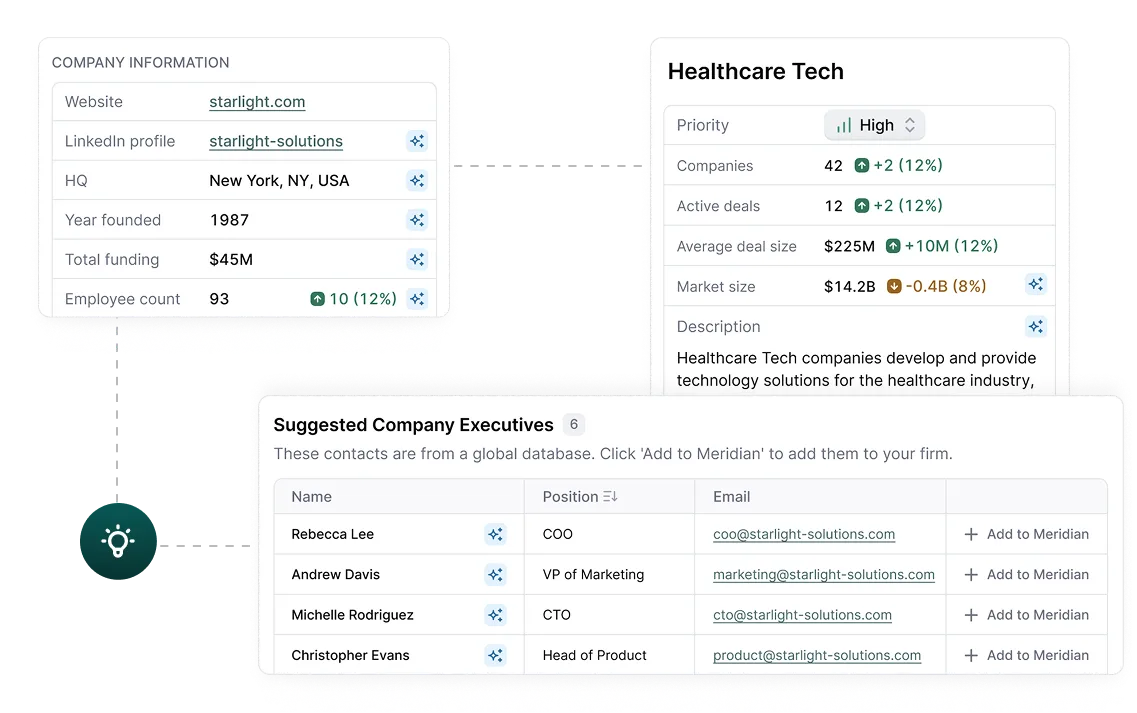
The best alternative to Salesforce will depend on what industry you’re working in and what you need your CRM platform to do.
For marketing teams, HubSpot could be a good option. Sales teams might prefer Pipedrive. And private equity professionals will like Meridian, which is built to support long deal cycles and provide the relationship tracking PE firms need.
The best CRM is the one that gets used daily, by your whole team and without needing a full-time CRM consultant to keep it alive. This is where Meridian wins. It’s built from the ground up for private equity workflow management to eliminate manual data input and create visibility across the deal flow lifecycle.
Salesforce is the go-to customer relationship management platform for many businesses, but many G2 reviewers point out that it’s difficult to master, expensive to maintain, and doesn’t always have the features they need. These are just a few of the reasons why companies are leaving Salesforce for other CRMs.
To do deal sourcing right, you need to build a deep understanding of markets and intermediary relationships and the ability to move fast when opportunities land.
Meridian’s private equity CRM software is built to help you do exactly that. It auto-captures outreach, enriches contact and company data, and uses AI to map markets and surface opportunities so private equity investors can close deals early and often.
Table of Contents


Why the PE on-cycle machine persists, and how both firms and candidates can make better decisions anyway.

